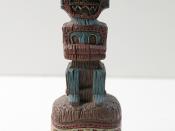The inner journey is one which involves the hurdling of psychological barriers, as well as cultural and social obstacles, rather than just a physical trek. The novel Things Fall Apart (1958) by Chinua Achebe and the film Whale Rider (2002) by Niki Caro both address the overcoming of emotional boundaries, while following the progress of the main characters. Issues such as cultural differences and gender equality are presented by the composers through the clever use of devices appropriate to the medium, while using the post-colonial context to accentuate these issues.
Similar to Things Fall Apart, the film Whale Rider by Niki Caro explores the breakdown of Maori culture in post-colonial New Zealand. It follows the journeys of Pai, a young girl, and Koro, her grandfather, who both seek to uphold and preserve the Maori tradition, which has been negatively influenced by the European culture. During the film, Pai transforms from an unwanted child to the new village leader, while challenging the Maori customs through her curiosity, for example when she learns the sacred art of the taiaha.
Koro, who disapproves of her actions, smashes a cup in his anger. Koro's wife, Flowers, reprimands him, saying, "You might be the boss out there, but I'm the boss in this kitchen". Caro is addressing the gender barrier which exists in the Maori culture, an obstacle which Pai overcomes in her journey.
Despite being reprimanded by Koro, Pai still retains great love for him, as seen in her speech on her ancestors, where she dedicates her words to Koro. The initial long shot places emphasis on Pai, while the camera is positioned at a low-angle, suggesting that she has gained authority and leadership. This scene symbolises one of the many emotional hurdles she has had to overcome in her inner journey. Moreover, her...


